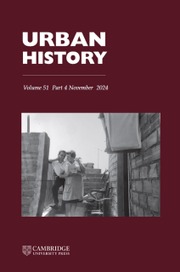I remember studying the geography of urban influence by tracking the locations of people who purchased the metropolitan newspaper. Electronic information network availability has greatly diminished the relevance of print media distribution as a measure of spatial reach. The quest remains, however, to keep track of how information flows bind us or release us from the confines of location. The essays in this edited book describe how we might conceive, criticize and in a few cases promote how ideas take shape and travel as policies or strategies for civic improvement across continents, nations, regions and cities.
The editors claim that the essays go well beyond the narrow and ballistic conception of policy transfer as diffusion. They recognize that interactive relationships provide the proper focus for inquiry, rather than dualistic conceptions of territory and mobility. However, varieties of systems theory grasped the wisdom of this approach long ago, even if these were not politically savvy or progressive. The essays mostly offer a distinctly socialist- and Marxist-inspired approach, laying rhetorical waste to the neo-liberal nostrums that have come to dominate many urban policy arenas. The shop talk vocabulary at times proves a bit off-putting and sometimes incomprehensible to those not keeping tabs on what left-leaning geographers argue about. I am not convinced that using ‘assemblages’, ‘relationalities’ or ‘mobilities’ to describe how policy ideas travel and settle adds enough understanding to make the vocabulary worth it.
Doreen Massey wants me to believe that when Ken Livingstone swapped oil for technical experience with the Chavez government in Caracas the effect was ‘counterhegemonic’. The relational rhetoric seems to me to masquerade the political weakness of socialist politics and perversely strengthen the grip of neo-liberal ideas as accessible and popular. The institutional roles of city government – even one as powerful as London – cannot engage in unilateral political agreements that ignore or violate national policies and regulations without inviting political retribution. For Jennifer Robinson, cities now prepare strategies that attend to global economic pressures and include stakeholder participants who also consider issues of sustainability and quality of life. Whether located in rich or poor nations, local places adapt circulating strategic ideas regardless of origin. Political context and power matter, but not as one-way domination from core to periphery. Neo-liberal ideas remain subject to local interpretation and co-optation, whether in Tijuana or London. Strategy innovation confronts institutional resistance and makes local headway tapping the global circulation of policy in complex ways.
Jamie Peck takes aim at the ‘creative cities’ mania, drawing a stark contrast with socialist visions for coping with industrial restructuring. Deconstructing the creative hucksterism enticing members of the creative class to Detroit and Memphis makes for fun reading. However, Peck's historic recovery of tales of socialist resistance and innovation by the GLC ironically seems to elevate the political success of neo-liberal policies that followed. Peck recognizes that the political popularity of the creativity policy outweighs its practical relevance; a point the socialist policy makers would grasp. But he does not address the puzzling question of the political unpopularity of socialist goals and ideas.
Kevin Ward studies Business Improvement Districts (BIDs), describing how a policy tool developed in one place (Canada) gained popularity and ideological identity in another (USA) before spreading rapidly across the globe (UK). The tool changed as institutional actors and policy differences in each place modified how the BID worked. The formal and informal channels of policy exchange enabled participants to adapt the BID for each place, even as the evidence shows extensive variation in local uptake. The powerful can make policy tools that others want, but the transfer and adaptation resists a singular path.
Vancouver's drug policy, for Eugene McCann, collected and debated ideas from Frankfurt and Zurich (harm reduction) and San Patrignano (therapeutic community) in the development of local drug policy for the Downtown Eastside. The transfer of ideas from such different places included a variety of selective experiences and interventions. Local drug policy is an amalgam of local and global content and form. Keil and Ali use the international response to the SARS epidemic threat to explore how network and hierarchy mediate the flow of pathogens carried by travellers. Improved connectivity increases global access to virtually everything, including germs; the varieties of hierarchical structure make it difficult to anticipate and monitor the flow of travellers through the networks that cut across these. The mobilization taught a host of respondents that they could adopt policies and take actions that would cut across national hierarchies to prepare more effectively for the spread of network contagion.
The layers and streams of policy exchange and adaptation fuel innovation and repression in neo-liberal civic strategy. Despite often cynical self-serving consultancy, useful progressive ideas manage to travel back and forth.


